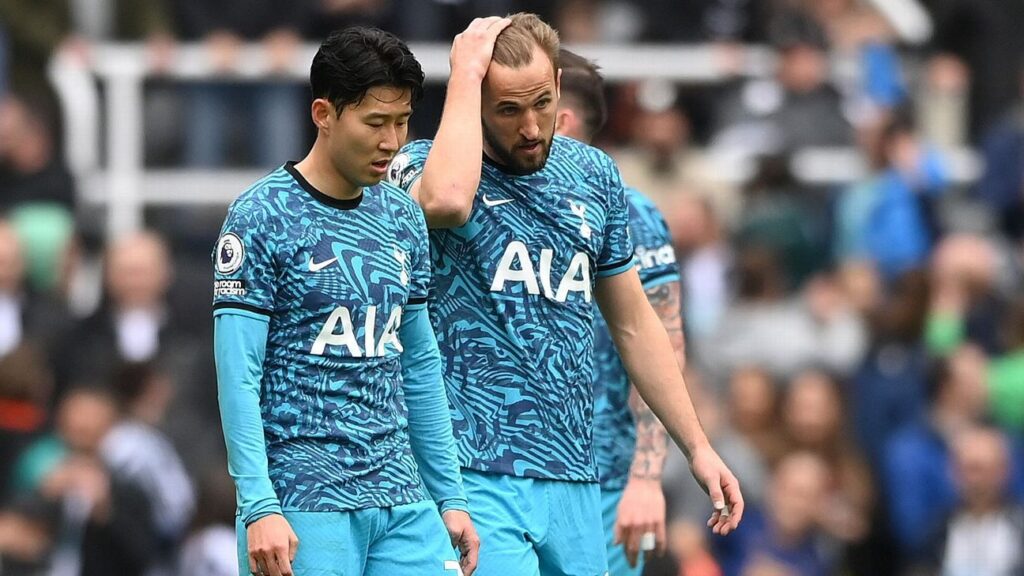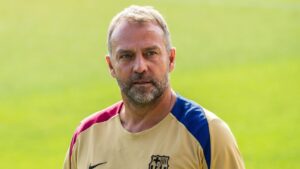NEWCASTLE-UPON-TYNE, England — Money 6, Mismanagement 1. There has been a sense for some time that Newcastle United and Tottenham Hotspur have been on differing trajectories, but few would have imagined the Champions League baton would have been passed quite as emphatically as at St James’ Park on Sunday.
Spurs’ complete capitulation on Tyneside is the tangible manifestation of a club losing all sense of direction and, very probably, conceding their Premier League top-four place to a team possessing the purpose and cohesion they lack.
– Stream on ESPN+: LaLiga, Bundesliga, more (U.S.)
Rightly, there is enduring focus on the source of Newcastle’s wealth given renewed scepticism over the “legally binding assurances” the Premier League say they received which determine the Saudi Public Investment Fund is separated from the Kingdom of Saudi Arabia. But if the football can be separated from the finance, it must be stressed that money alone does not guarantee success. Look at Chelsea as they are right now, or Manchester United in the decade since Sir Alex Ferguson retired as manager.
Newcastle have not opted for the fast-track approach that Manchester City initially tried under Sheikh Mansour in 2008, when they signed Brazil forward Robinho from Real Madrid on deadline day in a glamour move epitomising a club trying to run before they could walk. Instead, manager Eddie Howe has steadfastly built a team that is primarily difficult to beat — boasting the best defensive record in the division — by signing multiple players with knowledge of the Premier League while strengthening an attack with exciting options including Sweden forward Alexander Isak.
The end product is a team unified in belief and purpose, everything Spurs are not. And when you think of the headstart Tottenham had over Newcastle last summer, the gulf between these two sides on Sunday is all the more unforgivable. Tottenham had Antonio Conte, Champions League football and a £160 million transfer spend to try and close the gap on Manchester City and Liverpool.
It has long been the case that Spurs do not possess the financial might of Manchester City, Manchester United and Chelsea, meaning they have to compete by making smart decisions, spending shrewdly and committing fully to a clear plan.
The biggest mistake Spurs made in appointing Conte was not backing him wholeheartedly. That is not to say Conte should have got everything he asked for — very few managers, if any, receive such treatment — but the Italian was resolute in his belief wholesale change was needed with readymade, experienced players capable of winning now, not in three years. Conte’s philosophy is well-established, as is Spurs’ preference for investing in younger talent to nurture over time. And so while Conte should have got more out of the squad he was given — a bit more entertainment wouldn’t have gone amiss, either — the principal error here was Tottenham’s.
They knew what they were getting into by appointing Conte but did not commit to his desired rebuild. Chairman Daniel Levy said this week it makes him “sick” that Arsenal have overtaken them in supporting Mikel Arteta’s plans so resolutely, with a similar outlay. It should do. The compromises have left Spurs irrevocably compromised. They are left with this half-in, half-out mess: a squad lacking centre-backs and wing-backs of sufficient quality, a one-dimensional midfield (admittedly weakened by Rodrigo Bentancur’s injury) and a profound lack of identity.
By dispensing with Conte but retaining his assistant Cristian Stellini on an interim basis, Spurs ensured they remained in limbo. Conte’s shadow looms large over a group of players he lamented for a lack of character and an ownership possessing insufficient ambition. It is hard to disagree with either conclusion on a day like this. The scorched earth he left behind is still smouldering.
What kind of club do Tottenham want to be? What kind of team are they now? These are questions which lack clear answers and explain in part why the search for a head coach continues at a slow pace.
Stellini tried something different on Sunday, abandoning Conte’s 3-4-3 shape to play 4-3-3. They were 5-0 down in 21 minutes before Stellini abandoned it. At half-time, a nationwide alarm went off on millions of mobile phones due to the United Kingdom government testing a new emergency system. It came about an hour too late for Spurs, who were asleep at kick-off here.
First, Joelinton cut inside with ease and when his shot was saved by goalkeeper Hugo Lloris, Jacob Murphy reacted first to turn home the rebound. The game was 61 seconds old. Joelinton then raced onto Fabian Schar’s through ball to round Lloris and score. Pedro Porro tried to play offside in vain and Cristian Romero appeared to let the ball drop straight into Joelinton’s path. It was pathetic. Murphy then took aim from 25 yards and found the far corner. Lloris didn’t move. Next, Isak raced through to meet Joe Willock’s sumptuous pass and converted before he added his second with a smart finish from Sean Longstaff’s clever reverse pass.
Stellini hauled off Pape Matar Sarr and brought on Davinson Sanchez, booed in last week’s home defeat to Bournemouth. Throwing him on at 5-0 down here felt like an even bigger punishment. Spurs stabilised a little and stemmed the bleeding. Newcastle had been ruthlessly clinical, as evidenced by their half-time xG of 2.29 yet scoring five. It was the second-quickest time in which a team had raced into a 5-0 lead in Premier League history, and the seventh time a team has gone in at the interval trailing by that score.
And as if to give us an opportunity to discuss another elephant in the room, Harry Kane provided a reminder of his enduring quality with a fine moment just after half-time, beating Schar with ease before rifling a shot past Nick Pope. The England captain is the flicker of light in the darkness. After substitute Callum Wilson added Newcastle’s sixth with a close-range finish on 67 minutes, the game concluded with Kane insisting his teammates go to the far end of the pitch and acknowledge the smattering of travelling fans who stayed.
His future will be discussed in the summer with a year remaining on his contract. But why would he stay? Kane turns 30 in July and judges himself against the very best in the game. Sunday’s goal takes him to 207, one behind Wayne Rooney in the all-time Premier League scoring charts as he closes in on Alan Shearer’s record of 260. But this is all Tottenham can offer him: a slow march towards individual milestones. Spurs have no director of football, no manager and no blueprint for future success.
There remains a glimmer of hope they could still qualify for next season’s Champions League — Thursday’s home game against Manchester United offers a chance to revive their fortunes but another difficult evening will see supporters turn on Levy, whose exit was called for in the opening 10 minutes from those beleaguered Spurs supporters on Tyneside.
This chastening, abject 90 minutes shocked many but, in truth, it has been a long time coming.




